第三人称单数的用法详细解说
第三人称单数用法讲解及练习题

动词第三人称单数形式讲解一、什么是第三人称单数?人称可分为三类:第一人称、第二人称和第三人称第一人称:I we第二人称:you第三人称:he、she、it、they和人名类(如:Peter、Jane、my father等)结合以上知识,第三人称单数就是he、she、it和单个的某人,也包括单个的动物、东西等。
二、动词为什么要变成相应的三单形式?在一般现在时中,跟在第三人称单数后面的动词也要变成相应的三单形式,例如:I watch TV every day. 如果主语是三单,动词要变化:He watches TV every day.She watches TV every day.Jane watches TV every day.三、动词三单的变化规则1、一般情况下直接加s,如speak-speaks, like-likes, play-plays2、以s, x, sh, ch, o 结尾的加es,如wash-washes, go-goes, do-does, watch-watches3、以辅音字母+y 结尾的,改y 为i 再加es,如study-studies,try-tries4、特殊变化,如have-has四、does和doesn’t 在句子中的用法否定句:主语+don’t/doesn’t+动词原形+(其他)。
如:I don’t watch TV. 我不看电视。
当主语为第三人称单数时,要用doesn’t 构成否定句。
如:He doesn’t watch TV. 他不看电视。
注意doesn’t后面用动词原形watch,而不是watches一般疑问句:Do / Does+主语+动词原形+(其他)。
如:Do you watch TV? Yes, I do. / No, I don’t.当主语为第三人称单数时,要用does 构成一般疑问句。
如:Does she watch TV? Yes, she does. / No, she doesn’t.特殊疑问句:疑问词+一般疑问句。
第三人称单数be动词
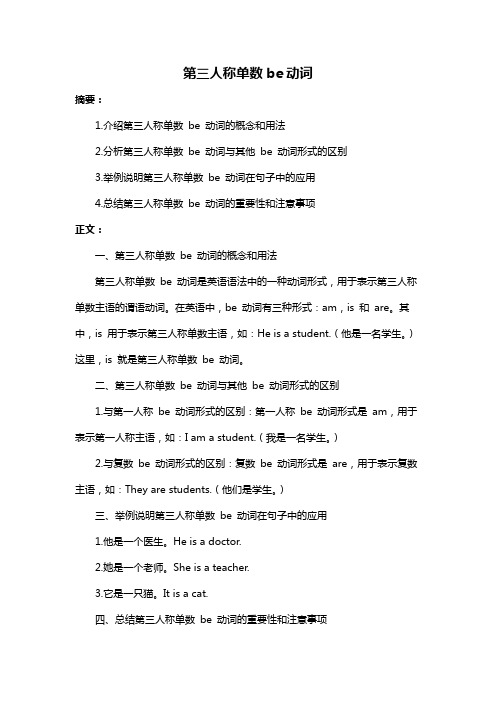
第三人称单数be动词摘要:1.介绍第三人称单数be 动词的概念和用法2.分析第三人称单数be 动词与其他be 动词形式的区别3.举例说明第三人称单数be 动词在句子中的应用4.总结第三人称单数be 动词的重要性和注意事项正文:一、第三人称单数be 动词的概念和用法第三人称单数be 动词是英语语法中的一种动词形式,用于表示第三人称单数主语的谓语动词。
在英语中,be 动词有三种形式:am,is 和are。
其中,is 用于表示第三人称单数主语,如:He is a student.(他是一名学生。
)这里,is 就是第三人称单数be 动词。
二、第三人称单数be 动词与其他be 动词形式的区别1.与第一人称be 动词形式的区别:第一人称be 动词形式是am,用于表示第一人称主语,如:I am a student.(我是一名学生。
)2.与复数be 动词形式的区别:复数be 动词形式是are,用于表示复数主语,如:They are students.(他们是学生。
)三、举例说明第三人称单数be 动词在句子中的应用1.他是一个医生。
He is a doctor.2.她是一个老师。
She is a teacher.3.它是一只猫。
It is a cat.四、总结第三人称单数be 动词的重要性和注意事项第三人称单数be 动词在英语中具有重要地位,它是表示第三人称单数主语的谓语动词。
使用时,需要注意以下几点:1.确保主语是第三人称单数,如:he,she,it 等。
2.选择正确的第三人称单数be 动词形式,即“is”。
3.在句子中,第三人称单数be 动词应与其他成分搭配使用,以表达完整的意思。
通过以上分析,我们可以了解到第三人称单数be 动词的概念、用法和注意事项。
第三人称单数的用法详细解 说

第三人称单数的用法在学习一般现在时态时,有一条重要的语法规则:当主语是第三人称单数时,谓语动词要用第三人称单数形式,即:动词be用is,动词have用has,行为动词在其后加-s或-es。
有些同学对第三人称单数主语分辨不清,经常出现错误。
为使同学们正确的辨认第三人称单数主语,现将其归纳如下:一、人称代词he, she, it。
例如:①He likes playing football 他喜欢踢足球。
②She is a good girl. 她是个好姑娘。
③It looks like a ball. 它看起来像个球。
二、单独用作主语的一个人名或称呼语,如:Jim, Kate, Miss Wang,Uncle Li, Father等。
例如:①Jim comes from England. 吉姆来自英国。
②Miss Wang teaches us English. 王老师教我们英语。
③Father often has lunch at home. 爸爸经常在家吃午饭。
三、单独作主语的一个地名或物名,如:China, Hong Kong, Macao, English, coffee等。
①China is a great country. 中国是一个伟大的国家。
②Coffee is my favorite drink. 咖啡是我最喜欢的饮料。
四、可数名词的单数。
例如:①A boy sits at the door. 一个男孩坐在门口。
②The book is mine. 这本书是我的。
五、不可数名词。
例如:①There is some milk in the glass. 玻璃杯里有些牛奶。
②The bread is on the table. 面包在桌子上。
六、指示代词this, that作主语。
例如:①This is a computer. 这是一台电脑。
②Whose bike is that? 那是谁的自行车?七、单个的时间名词作主语,如某年、某月、星期、日期、节假日名称等。
英语第三人称动词用法
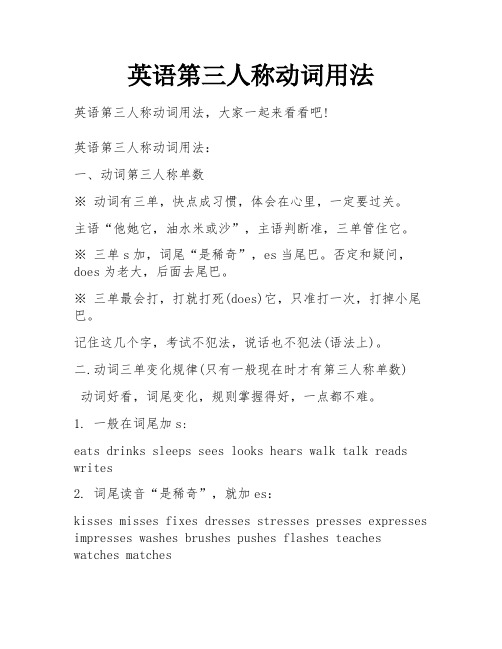
英语第三人称动词用法英语第三人称动词用法,大家一起来看看吧!英语第三人称动词用法:一、动词第三人称单数※ 动词有三单,快点成习惯,体会在心里,一定要过关。
主语“他她它,油水米或沙”,主语判断准,三单管住它。
※ 三单s加,词尾“是稀奇”,es当尾巴。
否定和疑问,does为老大,后面去尾巴。
※ 三单最会打,打就打死(does)它,只准打一次,打掉小尾巴。
记住这几个字,考试不犯法,说话也不犯法(语法上)。
二.动词三单变化规律(只有一般现在时才有第三人称单数)动词好看,词尾变化,规则掌握得好,一点都不难。
1. 一般在词尾加s:eats drinks sleeps sees looks hears walk talk reads writes2. 词尾读音“是稀奇”,就加es:kisses misses fixes dresses stresses presses expresses impresses washes brushes pushes flashes teaches watches matches3. 单词结尾y,千万别乱猜,元加y就不改,直接加s,辅音加y,改y为i加es:stay pay play buy say enjoy destroy display spray slaystudy--studies carry –carries marry—marries worry—worries hurry—hurries fly--flies try--tries dry—dries cry—cries bury--buries4. 记住特殊的两个单词go和do后面加es:goes does5. 记住最为特别的be的三单是is; have的三单是has.什么叫动词的第三人称单数形式:所谓动词的第三人称单数形式,是指一般现在时中,如果主语是第三人称单数,谓语动词会采取的形式。
比如:I like all sports. 我喜欢各种运动。
第三人称单数总结
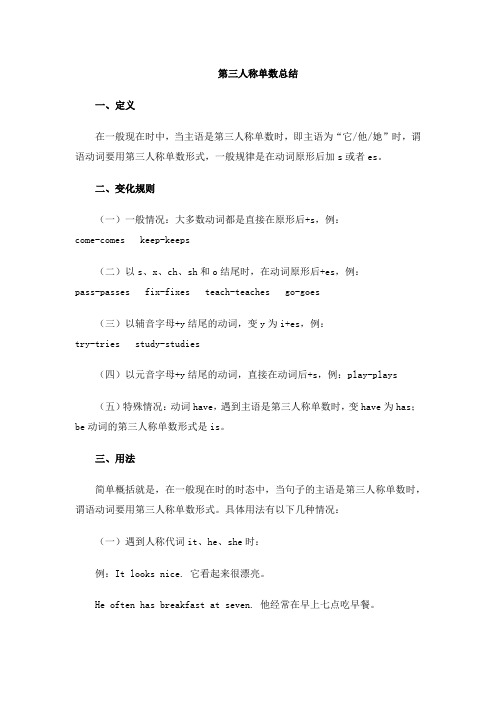
第三人称单数总结一、定义在一般现在时中,当主语是第三人称单数时,即主语为“它/他/她”时,谓语动词要用第三人称单数形式,一般规律是在动词原形后加s或者es。
二、变化规则(一)一般情况:大多数动词都是直接在原形后+s,例:come-comes keep-keeps(二)以s、x、ch、sh和o结尾时,在动词原形后+es,例:pass-passes fix-fixes teach-teaches go-goes(三)以辅音字母+y结尾的动词,变y为i+es,例:try-tries study-studies(四)以元音字母+y结尾的动词,直接在动词后+s,例:play-plays(五)特殊情况:动词have,遇到主语是第三人称单数时,变have为has;be动词的第三人称单数形式是is。
三、用法简单概括就是,在一般现在时的时态中,当句子的主语是第三人称单数时,谓语动词要用第三人称单数形式。
具体用法有以下几种情况:(一)遇到人称代词it、he、she时:例:It looks nice. 它看起来很漂亮。
He often has breakfast at seven. 他经常在早上七点吃早餐。
She likes dancing. 她喜欢跳舞。
(二)单个人名、地名或称呼作主语时:例:Li Lei looks like his father. 李雷看起来像他爸爸。
Fu jian is in China. 福建在中国。
Uncle Zhan often makes cakes. 詹叔叔经常做蛋糕。
(三)单数可数名词或“this/that/the+单数可数名词”作主语时:例:An apple is on the desk. 有一个苹果在桌上。
This car is black. 这辆车是黑色的。
That book is yours. 那本书是你的。
The cat looks so cute. 这只猫看起来真可爱。
第三人称单数用法讲解及练习题知识分享

第三人称单数用法讲解及练习题动词第三人称单数形式讲解一、什么是第三人称单数?人称可分为三类:第一人称、第二人称和第三人称第一人称: I we第二人称: you第三人称: he、she、it、they和人名类(如:Peter、Jane、my father 等)结合以上知识,第三人称单数就是he、she、it和单个的某人,也包括单个的动物、东西等。
二、动词为什么要变成相应的三单形式?在一般现在时中,跟在第三人称单数后面的动词也要变成相应的三单形式,例如:I watch TV every day. 如果主语是三单,动词要变化:He watches TV every day.She watches TV every day.Jane watches TV every day.三、动词三单的变化规则1、一般情况下直接加s,如speak-speaks, like-likes, play-plays2、以s, x, sh, ch, o 结尾的加es,如 wash-washes, go-goes, do-does, watch-watches3、以辅音字母+y 结尾的,改y 为i 再加es,如 study-studies,try-tries4、特殊变化,如 have-has四、does和doesn’t 在句子中的用法否定句:主语+don’t/doesn’t+动词原形+(其他)。
如:I don’t watch TV. 我不看电视。
当主语为第三人称单数时,要用doesn’t 构成否定句。
如:He doesn’t watch TV. 他不看电视。
注意doesn’t后面用动词原形watch,而不是watches一般疑问句:Do / Does+主语+动词原形+(其他)。
如:Do you watch TV? Yes, I do. / No, I don’t.当主语为第三人称单数时,要用does 构成一般疑问句。
如:Does she watch TV? Yes, she does. / No, she doesn’t.特殊疑问句:疑问词+一般疑问句。
英语第三人称单数形式
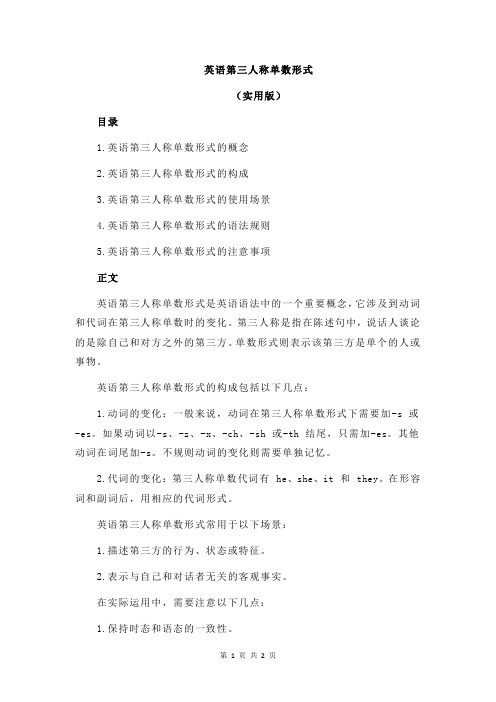
英语第三人称单数形式
(实用版)
目录
1.英语第三人称单数形式的概念
2.英语第三人称单数形式的构成
3.英语第三人称单数形式的使用场景
4.英语第三人称单数形式的语法规则
5.英语第三人称单数形式的注意事项
正文
英语第三人称单数形式是英语语法中的一个重要概念,它涉及到动词和代词在第三人称单数时的变化。
第三人称是指在陈述句中,说话人谈论的是除自己和对方之外的第三方。
单数形式则表示该第三方是单个的人或事物。
英语第三人称单数形式的构成包括以下几点:
1.动词的变化:一般来说,动词在第三人称单数形式下需要加-s 或-es。
如果动词以-s、-z、-x、-ch、-sh 或-th 结尾,只需加-es。
其他动词在词尾加-s。
不规则动词的变化则需要单独记忆。
2.代词的变化:第三人称单数代词有 he、she、it 和 they。
在形容词和副词后,用相应的代词形式。
英语第三人称单数形式常用于以下场景:
1.描述第三方的行为、状态或特征。
2.表示与自己和对话者无关的客观事实。
在实际运用中,需要注意以下几点:
1.保持时态和语态的一致性。
2.根据句子的语境选择恰当的动词形式。
3.注意不规则动词的变化,加强记忆。
总之,英语第三人称单数形式是英语语法中的基本组成部分,掌握它有助于我们更加准确地表达思想和理解他人的观点。
小学英语第三人称单数用法语法详细解析(含例句中英文)
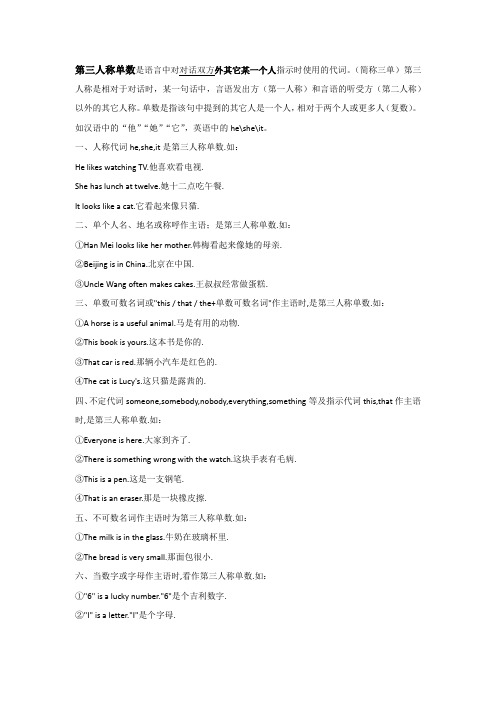
第三人称单数是语言中对对话双方外其它某一个人指示时使用的代词。
(简称三单)第三人称是相对于对话时,某一句话中,言语发出方(第一人称)和言语的听受方(第二人称)以外的其它人称。
单数是指该句中提到的其它人是一个人,相对于两个人或更多人(复数)。
如汉语中的“他”“她”“它”,英语中的he\she\it。
一、人称代词he,she,it是第三人称单数.如:He likes watching TV.他喜欢看电视.She has lunch at twelve.她十二点吃午餐.It looks like a cat.它看起来像只猫.二、单个人名、地名或称呼作主语;是第三人称单数.如:①Han Mei looks like her mother.韩梅看起来像她的母亲.②Beijing is in China.北京在中国.③Uncle Wang often makes cakes.王叔叔经常做蛋糕.三、单数可数名词或"this / that / the+单数可数名词"作主语时,是第三人称单数.如:①A horse is a useful animal.马是有用的动物.②This book is yours.这本书是你的.③That car is red.那辆小汽车是红色的.④The cat is Lucy's.这只猫是露茜的.四、不定代词someone,somebody,nobody,everything,something等及指示代词this,that作主语时,是第三人称单数.如:①Everyone is here.大家到齐了.②There is something wrong with the watch.这块手表有毛病.③This is a pen.这是一支钢笔.④That is an eraser.那是一块橡皮擦.五、不可数名词作主语时为第三人称单数.如:①The milk is in the glass.牛奶在玻璃杯里.②The bread is very small.那面包很小.六、当数字或字母作主语时,看作第三人称单数.如:①"6" is a lucky number."6"是个吉利数字.②"I" is a letter."I"是个字母.。
小学英语动词第三人称单数形式用法详解

般现在时中的第三人称单数形式在一般现在时中,当主语是第三人称单数时,谓语动词要用第三人称单数形式,形后加-s或-es。
(一)什么是一般现在时?一般现在时的基本用法有哪些呢?【一般现在时的功能】1. 表示事物或人物的特征、状态。
如:The sky is blue.天空是蓝色的。
2. 表示经常性或习惯性的动作。
如:I get up at six every day.我每天六点起床。
标志词(时间状语):always, every week (day, year, month …),once a week, every …,sometimes, at …,on Sun day uausllyoften,never,hardly.........3. 表示客观现实。
如:The earth goes around the sun.地球绕着太阳转。
(二)哪些主语是第三人称单数?现归纳总结如下:、单个人名、地名或称呼作主语;是第三人称单数。
如:①Han Mei looks like her mother. 韩梅看起来像她的母亲。
②Beiji ng is in Chi na. 北京在中国。
即常在动词原人称代词he, she, itHe likes watch ing TV. he has lunch at twelve. It looks like a cat. 是第三人称单数。
如:他喜欢看电视。
她十二点吃午餐。
它看起来像只猫。
③Uncle Wang ofte n makes cakes. 王叔叔经常做蛋糕。
① A horse is a useful animal.四、不定代词 someone, somebody, nobody, everything, something that 作主语时,是第三人称单数。
如:① Everyone is here. 大家到齐了。
② There is something wrong with the watch.③ This is a pen. 这是一支钢笔。
单数第三人称动词用法及变化规则
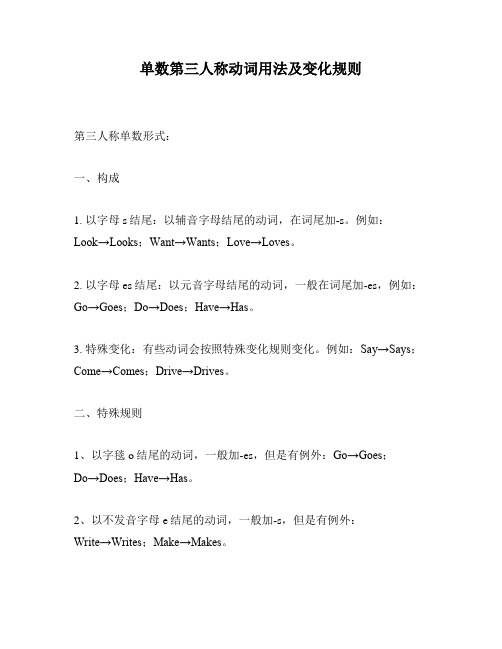
单数第三人称动词用法及变化规则第三人称单数形式:一、构成1. 以字母s结尾:以辅音字母结尾的动词,在词尾加-s。
例如:Look→Looks;Want→Wants;Love→Loves。
2. 以字母es结尾:以元音字母结尾的动词,一般在词尾加-es,例如:Go→Goes;Do→Does;Have→Has。
3. 特殊变化:有些动词会按照特殊变化规则变化。
例如:Say→Says;Come→Comes;Drive→Drives。
二、特殊规则1、以字毯o结尾的动词,一般加-es,但是有例外:Go→Goes;Do→Does;Have→Has。
2、以不发音字母e结尾的动词,一般加-s,但是有例外:Write→Writes;Make→Makes。
3、以辅音字母加y结尾的动词,去y加-ies:Attend→Attends;Carry→Carries。
4、以-ch、-sh、-z、-x结尾的动词,加-es:Watch→Watches;Rush→rushes;Fizz→Fizzes;Fix→Fixes。
5、有些双写的字母,加-es,例如:Dr ess→Dresses;Miss→Misses;Wish→Wishes;Buzz→Buzzes。
6、有的动词的变化太多了,只能熟记:Be→Is;Have→Has;Know→Knows。
7、有的动词,复杂到没有规律可言,只能记忆:Cut→Cuts;Put→Puts;Shut→Shuts。
三、谓-补结构在句子中,一般第三人称单数形式,后面跟be动词和介词短语形成谓-补结构:1. 用is结构:He is at home.2. 用are结构:They are in the room.3. 用am结构:She am in the study.4. 用has/have结构:He has a nice watch.以上是关于第三人称单数构成及变化规则的介绍,大家要好好记忆,日积月累,运用起来就很自然了。
第三人称单数的用法
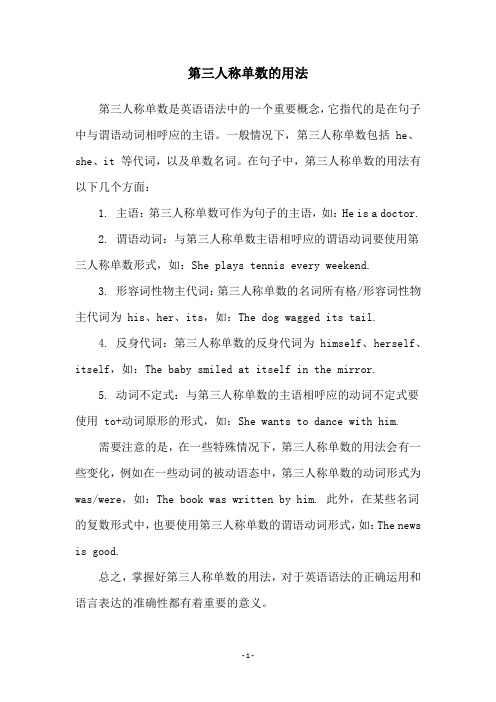
第三人称单数的用法
第三人称单数是英语语法中的一个重要概念,它指代的是在句子中与谓语动词相呼应的主语。
一般情况下,第三人称单数包括 he、she、it 等代词,以及单数名词。
在句子中,第三人称单数的用法有以下几个方面:
1. 主语:第三人称单数可作为句子的主语,如:He is a doctor.
2. 谓语动词:与第三人称单数主语相呼应的谓语动词要使用第三人称单数形式,如:She plays tennis every weekend.
3. 形容词性物主代词:第三人称单数的名词所有格/形容词性物主代词为 his、her、its,如:The dog wagged its tail.
4. 反身代词:第三人称单数的反身代词为 himself、herself、itself,如:The baby smiled at itself in the mirror.
5. 动词不定式:与第三人称单数的主语相呼应的动词不定式要使用 to+动词原形的形式,如:She wants to dance with him.
需要注意的是,在一些特殊情况下,第三人称单数的用法会有一些变化,例如在一些动词的被动语态中,第三人称单数的动词形式为was/were,如:The book was written by him. 此外,在某些名词的复数形式中,也要使用第三人称单数的谓语动词形式,如:The news is good.
总之,掌握好第三人称单数的用法,对于英语语法的正确运用和语言表达的准确性都有着重要的意义。
- 1 -。
第三人称单数用法讲解及练习题
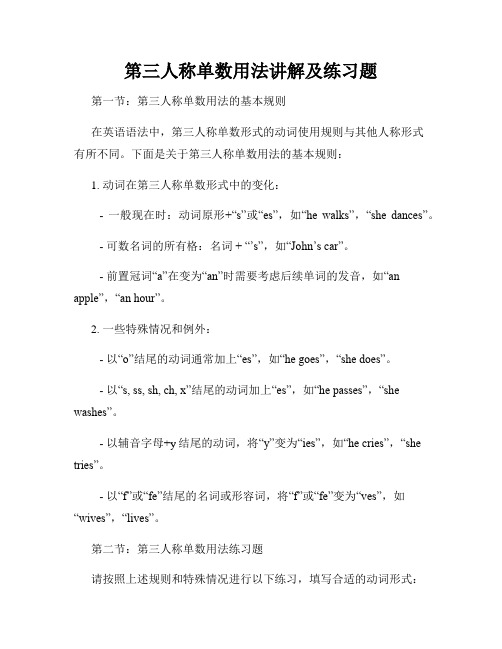
第三人称单数用法讲解及练习题第一节:第三人称单数用法的基本规则在英语语法中,第三人称单数形式的动词使用规则与其他人称形式有所不同。
下面是关于第三人称单数用法的基本规则:1. 动词在第三人称单数形式中的变化:- 一般现在时:动词原形+“s”或“es”,如“he walks”,“she dances”。
- 可数名词的所有格:名词+ “’s”,如“John’s car”。
- 前置冠词“a”在变为“an”时需要考虑后续单词的发音,如“an apple”,“an hour”。
2. 一些特殊情况和例外:- 以“o”结尾的动词通常加上“es”,如“he goes”,“she does”。
- 以“s, ss, sh, ch, x”结尾的动词加上“es”,如“he passes”,“she washes”。
- 以辅音字母+y结尾的动词,将“y”变为“ies”,如“he cries”,“she tries”。
- 以“f”或“fe”结尾的名词或形容词,将“f”或“fe”变为“ves”,如“wives”,“lives”。
第二节:第三人称单数用法练习题请按照上述规则和特殊情况进行以下练习,填写合适的动词形式:1. Mary _________ (watch) TV every evening.2. The cat _________ (jump) onto the table.3. David often _________ (play) basketball after school.4. The sun _________ (shine) brightly in the sky.5. My sister _________ (study) English at university.6. He _________ (fix) his car yesterday.7. The book _________ (belong) to Sarah.8. The dog _________ (bark) at the mailman.9. The teacher _________ (teach) math in the morning.10. The children _________ (have) fun at the park.答案:1. watches2. jumps3. plays4. shines5. studies6. fixed7. belongs8. barks9. teaches10. have第三节:总结和进一步练习通过上述练习可以看出,第三人称单数动词形式的使用需要注意变化规则和特殊情况。
第三人称单数的用法[五篇范例]
![第三人称单数的用法[五篇范例]](https://img.taocdn.com/s3/m/469a9ed8112de2bd960590c69ec3d5bbfd0adab5.png)
第三人称单数的用法[五篇范例]第一篇:第三人称单数的用法第三人称单数第三人称单数是英语中的一种语法,也称“三单”或“单三”,用于一般现在时的句子,当动词在第三人称单数后时【she、he、it、不可数名词和人名(一个人的)】,要根据其情况变化。
变化规则情况方法示例一般情况 +s play—plays 以s、x、ch、sh和o结尾 +es go—goes 以辅音字母加y结尾变y为i +es study—studies 以f或者fe结尾变f或fe为v+es life—lives 特殊情况不规则 have—has 用法首先,咱们要搞清楚第一、第二、第三人称各是什么。
第一人称就是“我”和“我们”。
第二人称是“你”和“你们”。
第三人称单数是“他”、“她”和“它”,复数则是“他们”。
中文大多数实义动词在词尾加“s”在清辅音后发音为/ s /在浊辅音及元音因素后发音为 / z /。
如speak→speaks /s/ come→comes /z/ play→pla ys /z/2、以辅音字母加“y”结尾的动词?要先将“y”变为“i”然后再加“es”读/z/。
如study→studies /z/ fly→flies /z/3、以“s x ch sh”结尾的动词在词尾加“es”发音为/ iz /。
如teach→teaches /iz/;watch→watches /iz/4、以“o”结尾的动词,在词尾加“es”。
常出现的两个以“o”结尾的动词go和do后加“es”?读/z/。
如?go→goes /z/ do→does /z/5、记住最为特别的be的三单is have的三单是has。
[注意] 1下面两个动词变三单时原词的元音部分的发音发生了较大的变化要记忆。
如do/du:/ →does/d z/ say/sei/ → says /sez/ 2以不发音字母“e”结尾的开音节词如果尾音是[s][z]时加“s”后字母“e”发音与所加“s” 一起读做[iz]。
什么时候用第三人称单数

什么时候用第三人称单数在一般现在时中,当主语是第三人称单数时,谓语动词要用第三人称单数形式,即常在动词原形后加-s或-es。
但有些同学们对于哪些主语是第三人称单数还不十分清楚,现归纳总结如下:一、人称代词he, she, it是第三人称单数。
如:He likeswatchi ng TV. 他喜欢看电视。
She has lunchat twelve. 她十二点吃午餐。
It lookslike a cat. 它看起来像只猫。
二、单个人名、地名或称呼作主语;是第三人称单数。
如:①Han Mei lookslike her mother. 韩梅看起来像她的母亲。
②Beijin g is in China.北京在中国。
③UncleWang oftenmakescakes.王叔叔经常做蛋糕。
三、单数可数名词或"this / that / the+单数可数名词"作主语时,是第三人称单数。
如:①A horseis a useful animal. 马是有用的动物。
②This book is yours.这本书是你的。
③That car is red. 那辆小汽车是红色的。
④The cat is Lucy's. 这只猫是露茜的。
四、不定代词so meone, somebo dy, nobody, everyt hing, someth ing等及指示代词t his, that 作主语时,是第三人称单数。
如:①Everyo ne is here. 大家到齐了。
②Thereis someth ing wrongwith the watch.这块手表有毛病。
③This is a pen. 这是一支钢笔。
④That is an eraser. 那是一块橡皮擦。
五、不可数名词作主语时为第三人称单数。
小学英语动词第三人称单数形式用法详解

小学英语动词第三人称单数形式用法详解在英语中,动词的第三人称单数形式是指在主语为第三人称单数(he,she,it,以及单数名词)的情况下使用的动词形式。
以下是关于第三人称单数形式的用法详解:1. 一般现在时(Simple Present Tense)在一般现在时中,第三人称单数形式的动词要在原形后加上-s或-es。
例如:- She plays basketball.(她打篮球。
)- He eats an apple.(他吃一个苹果。
)- It runs fast.(它跑得很快。
)2. 带有助动词do/does的疑问句和否定句在带有助动词do或does的疑问句和否定句中,动词恢复到原来的形式,而不加-s或-es。
例如:- Does she play basketball?(她打篮球吗?)- He doesn't eat an apple.(他不吃苹果。
)3.带有情态动词的句子在使用情态动词(can,will,would,should,may等)的句子中,动词也恢复到原来的形式,而不加-s或-es。
例如:- She can swim in the pool.(她可以在泳池里游泳。
)- It may rain tomorrow.(明天可能会下雨。
)4.一些特殊的动词有些动词的第三人称单数形式不是在原形后加上-s或-es。
例如:- have → has(有)- do → does(做)- go → goes(去)- be → is(是)需要注意的是,当主语是第三人称复数时,动词恢复到原形,而不加上-s或-es。
例如:- They play basketball.(他们打篮球。
)- We eat apples.(我们吃苹果。
)。
单三的用法
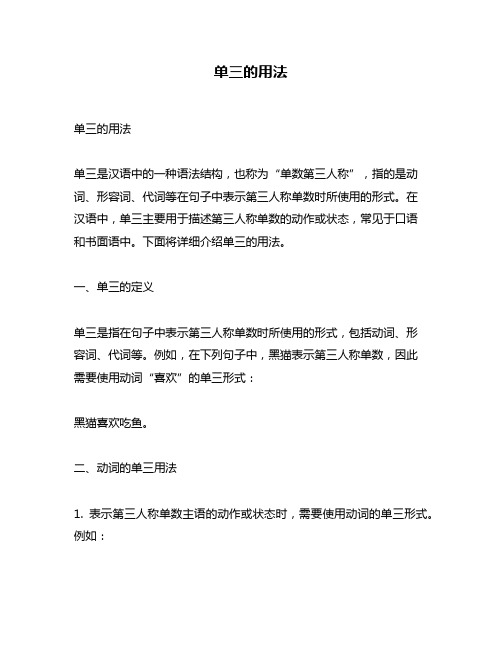
单三的用法单三的用法单三是汉语中的一种语法结构,也称为“单数第三人称”,指的是动词、形容词、代词等在句子中表示第三人称单数时所使用的形式。
在汉语中,单三主要用于描述第三人称单数的动作或状态,常见于口语和书面语中。
下面将详细介绍单三的用法。
一、单三的定义单三是指在句子中表示第三人称单数时所使用的形式,包括动词、形容词、代词等。
例如,在下列句子中,黑猫表示第三人称单数,因此需要使用动词“喜欢”的单三形式:黑猫喜欢吃鱼。
二、动词的单三用法1. 表示第三人称单数主语的动作或状态时,需要使用动词的单三形式。
例如:他喜欢吃苹果。
她每天都去跑步。
这只小狗很聪明。
2. 在疑问句中询问第三人称单数主语时,也需要使用动词的单三形式。
例如:他喜欢什么?她每天都做什么?这只小狗叫什么名字?3. 在祈使句中要求第三人称单数主语做某事时,也需要使用动词的单三形式。
例如:他请你进来。
她走开一点。
这只小狗坐下。
三、形容词的单三用法1. 在句子中描述第三人称单数主语的特征时,需要使用形容词的单三形式。
例如:这只猫很漂亮。
他很聪明。
她很勇敢。
2. 在疑问句中询问第三人称单数主语的特征时,也需要使用形容词的单三形式。
例如:这只猫是什么颜色的?他有多聪明?她有多勇敢?四、代词的单三用法1. 在句子中代替第三人称单数主语时,需要使用代词的单三形式。
例如:他喜欢吃苹果,但是他不喜欢吃橙子。
她每天都去跑步,因为她想保持健康。
这只小狗很聪明,它经常能听懂人类的指令。
2. 在句子中代替第三人称单数宾语时,也需要使用代词的单三形式。
例如:我看到了一只黑猫,它正在追逐一只老鼠。
你听到了吗?那是风声。
他买了一瓶饮料,但是他不喜欢它的味道。
五、注意事项1. 单三在句子中的位置通常在主语之后,谓语动词之前。
例如:这只小狗很聪明。
他喜欢吃苹果。
2. 在使用单三时,需要注意时态、语态等方面的变化。
例如:现在进行时的单三形式为“is/are + Ving”,如:He is eating an apple.被动语态的单三形式为“is/are + Vp.p”,如:The apple is eaten by him.3. 在使用代词的单三形式时,需要注意避免重复使用。
单数第三人称动词用法及变化规则
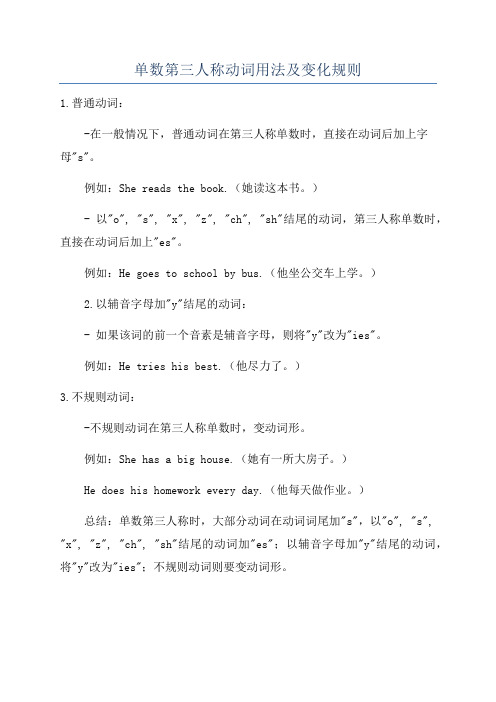
单数第三人称动词用法及变化规则
1.普通动词:
-在一般情况下,普通动词在第三人称单数时,直接在动词后加上字母"s"。
例如:She reads the book.(她读这本书。
)
- 以"o", "s", "x", "z", "ch", "sh"结尾的动词,第三人称单数时,直接在动词后加上"es"。
例如:He goes to school by bus.(他坐公交车上学。
)
2.以辅音字母加"y"结尾的动词:
- 如果该词的前一个音素是辅音字母,则将"y"改为"ies"。
例如:He tries his best.(他尽力了。
)
3.不规则动词:
-不规则动词在第三人称单数时,变动词形。
例如:She has a big house.(她有一所大房子。
)
He does his homework every day.(他每天做作业。
)
总结:单数第三人称时,大部分动词在动词词尾加"s",以"o", "s", "x", "z", "ch", "sh"结尾的动词加"es";以辅音字母加"y"结尾的动词,将"y"改为"ies";不规则动词则要变动词形。
does is do的用法
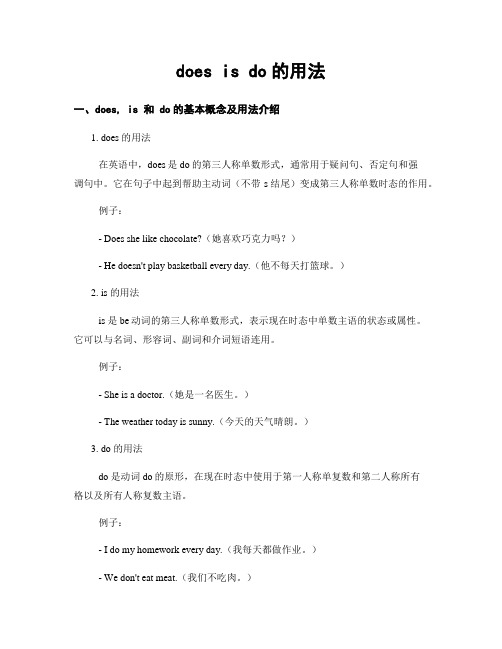
does is do的用法一、does, is 和 do的基本概念及用法介绍1. does 的用法在英语中,does是do的第三人称单数形式,通常用于疑问句、否定句和强调句中。
它在句子中起到帮助主动词(不带s结尾)变成第三人称单数时态的作用。
例子:- Does she like chocolate?(她喜欢巧克力吗?)- He doesn't play basketball every day.(他不每天打篮球。
)2. is 的用法is 是be动词的第三人称单数形式,表示现在时态中单数主语的状态或属性。
它可以与名词、形容词、副词和介词短语连用。
例子:- She is a doctor.(她是一名医生。
)- The weather today is sunny.(今天的天气晴朗。
)3. do 的用法do 是动词do的原形,在现在时态中使用于第一人称单复数和第二人称所有格以及所有人称复数主语。
例子:- I do my homework every day.(我每天都做作业。
)- We don't eat meat.(我们不吃肉。
)二、does, is 和 do的区别和例句解析1. 所表达的时态不同- does:用于现在时态的第三人称单数形式。
- is:用于现在时态,表示一个主语当前状态或属性。
- do:用于现在时态中第一人称单复数、第二人称所有格和所有人称复数。
2. 句型结构有差异- does:在疑问句和否定句中,与主语连用,并放在主语之前,其余部分使用动词原形。
例子:- Does she like ice cream?(她喜欢冰淇淋吗?)- He doesn't eat meat.(他不吃肉。
)- is:与名词、形容词、副词和介词短语连用,并构成陈述句结构。
例子:- She is a singer.(她是一名歌手。
)- The cake is delicious.(这个蛋糕很好吃。
第三人称单数用法总结(课间教案)[五篇]
![第三人称单数用法总结(课间教案)[五篇]](https://img.taocdn.com/s3/m/820e821ce3bd960590c69ec3d5bbfd0a7856d545.png)
第三人称单数用法总结(课间教案)[五篇]第一篇:第三人称单数用法总结(课间教案)第三人称单数问题一般现在时中,当主语是第三人称单数时,即常在动词原形后加-s或-es。
一、第三人称单数种类:1.人称代词he, she, it是第三人称单数。
如:①He likes watching TV.他喜欢看电视。
②She has lunch at twelve.她十二点吃午餐。
③It looks like a cat.它看起来像只猫。
2.单个人名、地名或称呼作主语;用第三人称单数。
如:①Han Mei looks like her mother.韩梅看起来像她的母亲。
②Beijing is in China.北京在中国。
③Uncle Wang often makes cakes.王叔叔经常做蛋糕。
3.单数可数名词或“this / that / the+单数可数名词”作主语时,是第三人称单数。
如:①A horse is a useful animal.马是有用的动物。
②This book is yours.这本书是你的。
③That car is red.那辆小汽车是红色的。
④The cat is Lucy's.这只猫是露茜的。
4.不定代词someone, somebody, nobody, everything, something等及指示代词this, that作主语时,第三人称单数。
①Everyone is here.大家到齐了。
②There is something wrong with the watch.这块手表有毛病。
③This is a pen.这是一支钢笔。
④That is an eraser.那是一块橡皮擦。
5.不可数名词作主语时为第三人称单数。
①The milk is in the glass.牛奶在玻璃瓶里。
②The bread is very small.面包很小。
6.当数字或字母作主语时,看作第三人称单数。
- 1、下载文档前请自行甄别文档内容的完整性,平台不提供额外的编辑、内容补充、找答案等附加服务。
- 2、"仅部分预览"的文档,不可在线预览部分如存在完整性等问题,可反馈申请退款(可完整预览的文档不适用该条件!)。
- 3、如文档侵犯您的权益,请联系客服反馈,我们会尽快为您处理(人工客服工作时间:9:00-18:30)。
第三人称单数的用法
在学习一般现在时态时,有一条重要的语法规则:当主语是第三人称单数时,谓语动词要用第三人称单数形式,即:动词be用is,动词have用has,行为动词在其后加-s或-es。
有些同学对第三人称单数主语分辨不清,经常出现错误。
为使同学们正确的辨认第三人称单数主语,现将其归纳如下:
一、人称代词he, she, it。
例如:
①He likes playing football 他喜欢踢足球。
②She is a good girl. 她是个好姑娘。
③It looks like a ball. 它看起来像个球。
二、单独用作主语的一个人名或称呼语,如:Jim, Kate, Miss Wang, Uncle Li, Father
等。
例如:
①Jim comes from England. 吉姆来自英国。
②Miss Wang teaches us English. 王老师教我们英语。
③Father often has lunch at home. 爸爸经常在家吃午饭。
三、单独作主语的一个地名或物名,如:China, Hong Kong, Macao, English, coffee等。
①China is a great country. 中国是一个伟大的国家。
②Coffee is my favorite drink. 咖啡是我最喜欢的饮料。
四、可数名词的单数。
例如:
①A boy sits at the door. 一个男孩坐在门口。
②The book is mine. 这本书是我的。
五、不可数名词。
例如:
①There is some milk in the glass. 玻璃杯里有些牛奶。
②The bread is on the table. 面包在桌子上。
六、指示代词this, that作主语。
例如:
①This is a computer. 这是一台电脑。
②Whose bike is that? 那是谁的自行车?
七、单个的时间名词作主语,如某年、某月、星期、日期、节假日名称等。
例如:
①Sunday is the first day of the week. 星期日是一周的第一天。
②June is the sixth month of the year. 六月份是一年的第六个月。
③September 10 is Teachers’ Day.九月十日是教师节。
八、不定代词everyone, something, anything等作主语时,视为第三人称单数。
例如
①Is everyone here today? 今天大家都来了吗?
②Something is wrong with your bike. 你的自行车有毛病。
1
九、one或one of+复数名词/代词作主语时,视为第三人称单数。
例如:
①One of the students comes from Australia. 其中的一个学生来自澳大利亚。
②She has two daughters. One is a teacher, the other is a doctor.
她有两个女儿,一个是教师,另一个是医生。
十、单个的数字、字母、单词或算式,视为第三人称单数。
例如:
①“8” is a good number in China. 在中国“8”是个吉祥的数字。
②“B” is between “A” and “C”. “B”在“A” 和“C” 之间。
③“You” is a pronoun. “You” 是一个代词。
④Two plus three is five. 二加三等于五。
十一、当and连接的两个名词在意义上指同一人、同一物体,视为第三人称单数。
①The teacher and writer is coming to our school tomorrow.
那位教师兼作家明天要到我们学校来。
②Bread and butter is his favorite food.
涂黄油的面包是他最喜欢吃的食品。
十二、第三人称单数不仅仅用在一般现在时态当中,还适用于其它时态当中。
①Tom was a good boy. (一般过去时)
②Alice was watching TV when her mother came in. (过去进行时)
③John has already finished his homework. (现在完成时)
④Kevin is going to go to Beijing next week. (一般将来时)
⑤Janey was going to go to Korea the next day. (过去将来时)
李勇2010-2-25整理于深圳
2。
